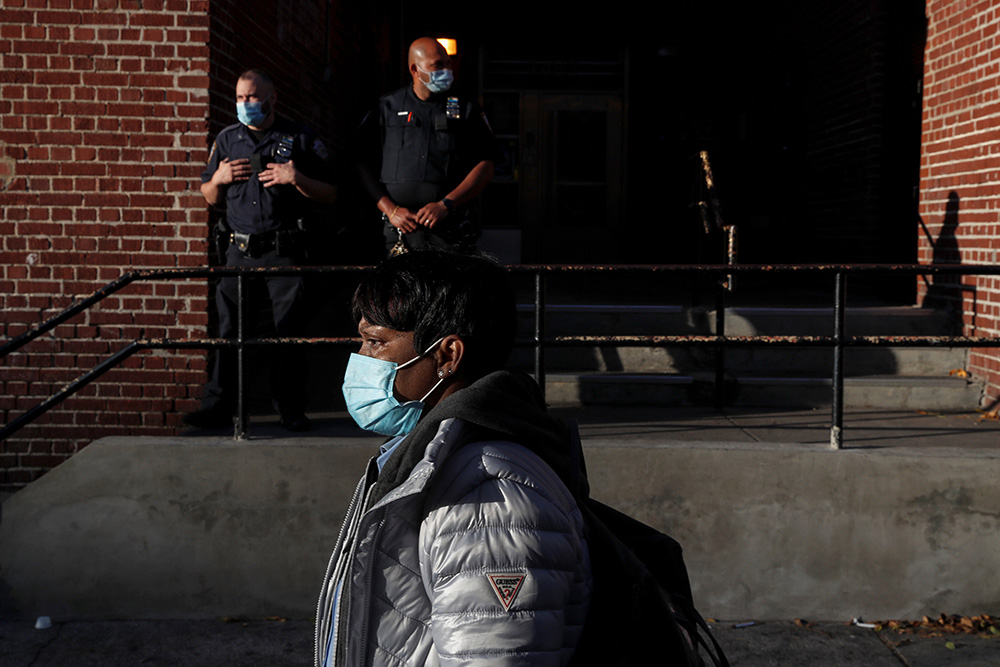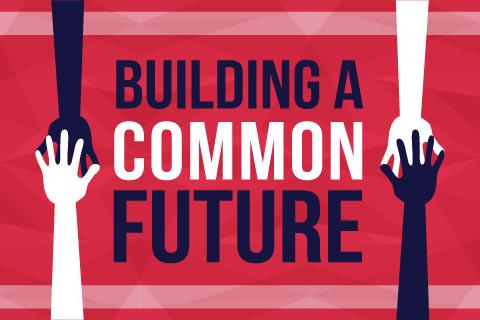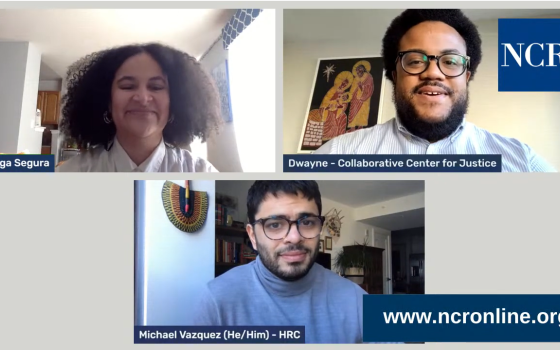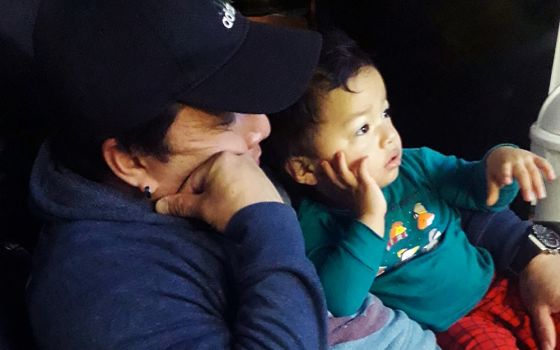
A woman walks past police officers in the Brooklyn borough of New York City Oct. 14, 2020. (CNS/Reuters/Shannon Stapleton)

(NCR graphic/Toni-Ann Ortiz)
Editor's note: In the weeks preceding the inauguration of the country's second Catholic president, the National Catholic Reporter asked other Catholic politicians, activists and scholars to offer advice to President-elect Joe Biden in a series that takes its title from Pope Francis' encyclical Fratelli Tutti: "Building a Common Future."
Pope Francis is obsessed with waste. The theme appears in each of his encyclicals. He's especially critical of how readily contemporary capitalist economies dispose of things they cannot extract use or profit from. It's most prominent in "Laudato Si', on Care for Our Common Home," his response to the environmental crisis, where it is closely linked to that document's most important theme: The line separating humanity from the rest of creation is an illusory one. What we do to the world, we do to ourselves. Under capitalism, there are surplus people.
In Fratelli Tutti, Francis' most recent encyclical, the practice of casting away the vulnerable is among the primary impediments to developing universal human fraternity. Be it the besieged Palestinian territories, the Mediterranean coasts of European Union member states, or overflowing U.S. prisons and jails, a society's throwaway-people, and how they are discarded, tell us a great deal about its values, how it defines humanity and which people get to participate in community.
There is no humane way to dispose of people; there is only anodyne language that hides the violence of the process.
Law enforcement agencies are the vanguard force of this process in the United States. They are the first point of contact in the system we use to dispose of our throwaway-people; namely, Black, Latinx, Indigenous people, and poor and disabled people of all races. This summer's protests against police brutality brought fresh attention to the harm police enact on these groups.
President-elect Joe Biden has promised to devote $300 million to so-called community policing, the central pillar of his plan to curtail police brutality. Community policing is a framework that places local law enforcement at the center of a web of relationships with some residents, business owners, and governmental and nonprofit agencies. Its stated aims are to use an increased police presence to reduce crime, solve nonemergency problems and build trust between communities and officers.
Policymakers have recycled this strategy in the wake of spectacular acts of police violence, from the 1991 Rodney King beating to the 2014 killing of Michael Brown and once again after police killed George Floyd and Breonna Taylor in 2020.
Unfortunately, there is little empirical evidence to support claims that this model is successful, despite 30 years of practice and near-universal adoption among large departments. There is no evidence that it reduces intracommunal harm. It does nothing to reduce run-ins with the law among overpoliced residents. To the contrary, it produces more arrests for petty offenses in part because it increases points of contact with the police by boosting the number of officers patrolling city streets.
This strategy of policing also promotes a dangerous vision of community that further marginalizes already vulnerable and overpoliced communities.
Advertisement
The "community" in the policing framework advanced by politicians like Biden is not inclusive. Rather, the interests of landlords, homeowners and businesses are privileged over the needs of society's most vulnerable, including homeless people, members of the informal workforce, the undocumented and renters. A homeless person, for instance, cannot participate in a neighborhood meeting with the police when anti-homeless laws have exploded across the nation.
Community policing is a kind of social bribery where the welfare state, such that it exists for marginalized people, is mediated through law enforcement agencies. In a recent story on Chicago's latest reforms, officers are said to have helped residents find jobs and housing and resolve issues such as speeding and excess noise. These are services for which competent civil servants would be welcome in any neighborhood. Community policing advocates rarely explain why said civil servants need to be cops, or why these services are so neglected that they need to be supplemented by anyone at all. Community policing takes class- and race-based austerity as a given.
More broadly, it illustrates how the American welfare state for the poor is tied to recipients being policed and surveilled by various agencies in exchange for basic human rights. As of 2017, at least 15 states passed laws mandating drug testing or screening for applicants or beneficiaries of public assistance.
While this carceral posture is taken with those who are deemed worthy of such degrading suspicion, it does not end there. In Connecticut, for instance, six months after state officials established a rental relief program, only two families out of nearly 30,000 applicants had received relief, largely because of overly strenuous proof of need requirements.
A familial bond among all people, at least that imagined by Fratelli Tutti, is impossible where "community" is defined in a way that enforces existing social hierarchies. The Gospel invites us — it commands us — to subvert those values at every level of social interaction by exercising a preferential option for the poor and vulnerable.
This is not just about being magnanimous. Rather, this posture also conditions us to see our own fragility in that of our neighbors. To demand of our policymakers a state that can care for all its people without the threat of violence. For Biden, soon to be our nation's second Catholic president, this means repentance. It would be a complete reversal of his career-long commitments to austerity and policing as a solution to our social problems, when the masses of vulnerable people can afford neither.





